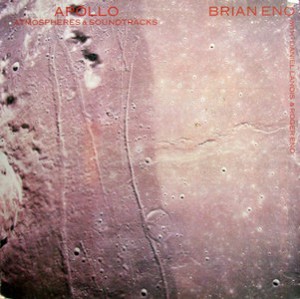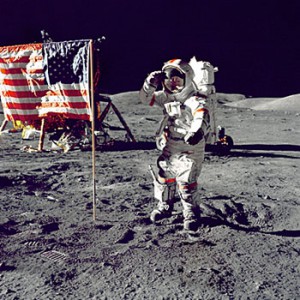Review: Apollo: This is For All Mankind performed by Icebreaker and BJ Cole
Article published: Tuesday, November 2nd 2010
The ethereal soundscape of Brian Eno’s 1983 ambient album Apollo: Atmospheres and Landscapes was brought to life by Icebreaker last Wednesday, as the the Royal Northern College of Music hosted a one-off performance as part of the Manchester Science Festival.
 Eno’s 1983 album was created to accompany Al Reinart’s documentary For All Mankind. Put together painstakingly from hours of original footage of the 1969 Apollo 11 moon landing, the film charts the trajectory of the astronauts from the moment they enter the space shuttle at the take-off platform overlooking Cape Canaveral, to their saunter on earth’s celestial sister and finally to their cushioned landing back on earth’s glittering seas.
Eno’s 1983 album was created to accompany Al Reinart’s documentary For All Mankind. Put together painstakingly from hours of original footage of the 1969 Apollo 11 moon landing, the film charts the trajectory of the astronauts from the moment they enter the space shuttle at the take-off platform overlooking Cape Canaveral, to their saunter on earth’s celestial sister and finally to their cushioned landing back on earth’s glittering seas.
Whilst Eno’s original is largely electronic in composition, Icebreaker opt for an interpretation of the piece through organic instrumentation. What they lose from the coldness of tone they make up in rich instrumental texturing, which shows how Eno would influence bands such as Mogwai, Godspeed You! Black Emperor and Sigur Ros; and in conjunction with the mesmerising footage the music conveys a dreamy vision of the landings.
Together the music and the film explore a series of themes that evoke philosophical questions about our place in the universe, time and distance and the aesthetics of technology. It is as much as tribute to the ferocious power of the industrial age as it is to space exploration itself: as the flames of the rocket shoot downwards in a solid ochre column, it is hard not to be awestruck by the centuries of toil and innovation which led to the epoch-making moment.
Throughout the spectacle the enormity of the distance is evoked not only visually, but through the ambience and isolation that the music suggests. The size of the craters and barren hills on the moon, presented in 35mm footage rarely seen on television, is awe-inspiring, and the brilliant luminosity of the moon is brought out all the more against the black abyss of space. During one sequence this combination of the audio and visual portrays a sense of childlike innocence and curiosity which can be seen as a metaphor for humankind in its constant exploration – whether by land, sea and air or internally. As the two astronauts bound across the surface, chasing one another in slow and bouncing steps and sending showers of dust flying, they have the air of children playing. But the sight of one of them falling over onto rocks, coupled with the tin-can technology of the pod in which they land, leaves you with your heart in your mouth; the evident vulnerability in which the two men find themselves strikes an incredible contrast with the boldness and audacity of the venture.
Later on we hear the sweet lilt of a pedal steel guitar (played by BJ Cole) and deliberately used by Eno as a reference to the fact that two of the three astronauts chose to take country music aboard the voyage. A sort of postmodern joke, this musical salute to country – and all its connotations of the cowboy and the unchartered American West – represents the paradox of culture folding in on itself as frontiers expand.
 An introductory talk from a curator at the National Museum of Science ensured that the performance was not devoid of political context: the idea of man as an intrepid adventurer, mythologised from the times of the Odyssey to the American Wild West, was shattered when viewing the lunar missions as a symbolic victory of one socio-economic system over another. It feels like what we believed to be audacity was in fact a staggering arrogance. With the landing placed historically, all of the hubris of the cold war and its various races – whether for arms, territory or space – are exposed in a thought-provoking presentation. At times the slowness of the performance’s movement makes it soporific, but you cannot fail to leave the auditorium without having asked yourself that wistful question: will we ever do it again?
An introductory talk from a curator at the National Museum of Science ensured that the performance was not devoid of political context: the idea of man as an intrepid adventurer, mythologised from the times of the Odyssey to the American Wild West, was shattered when viewing the lunar missions as a symbolic victory of one socio-economic system over another. It feels like what we believed to be audacity was in fact a staggering arrogance. With the landing placed historically, all of the hubris of the cold war and its various races – whether for arms, territory or space – are exposed in a thought-provoking presentation. At times the slowness of the performance’s movement makes it soporific, but you cannot fail to leave the auditorium without having asked yourself that wistful question: will we ever do it again?
Michael Pooler
Comments
No comments found
The comments are closed.



